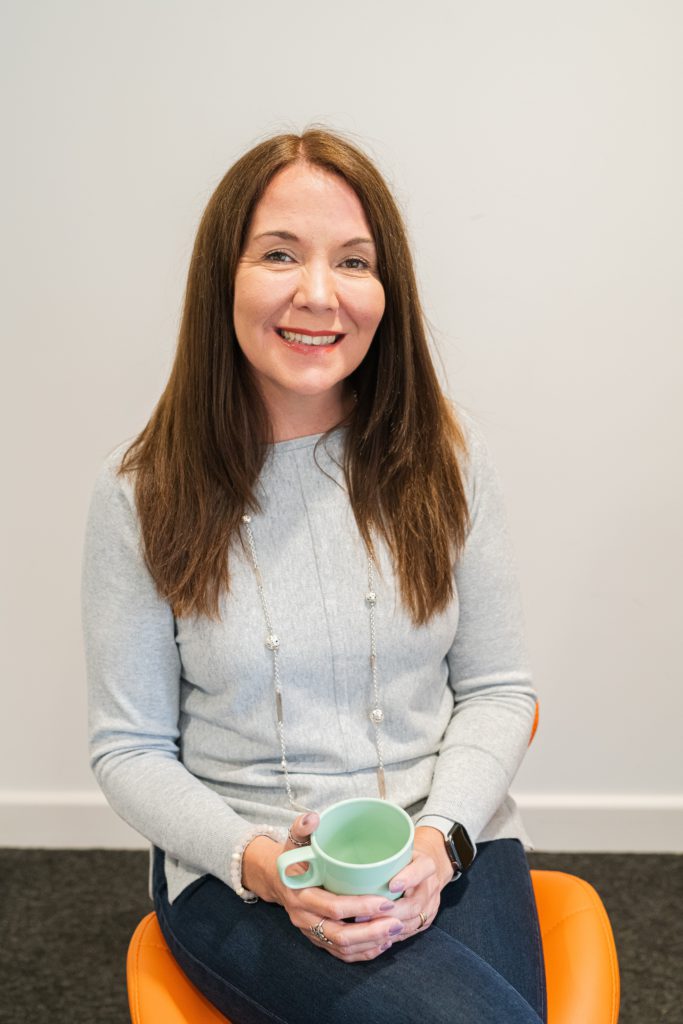Tagged: “Counseling”
Given that you deal with people who are deeply hurting, does this affect you emotionally? In other words, is it hard to deal with all the pain all the time?
The key issues are hope and passion for the work. Hope occurs when I see that hurting people can be healed. This increases my passion for the work, knowing that others need to hear the message of forgiveness and can greatly benefit by walking the forgiveness path.
Accredited Life Coach in UK Achieves Perfect Score on Forgiveness Therapy Course
Only two individuals in history have ever compiled perfect scores on Forgiveness Therapy, the clinical training course offered by the International Forgiveness Institute (IFI) for the past 13 years. The latest is a self-described “married mum of 2 teenagers, a dog lover/rescuer, and a martial artist (Tae Kwon Do)” from Buckinghamshire, United Kingdom, who also happens to be a Relationship and Life Coach.
Clare McCaffrey is an International Coaching Federation (ICF) Accredited Life Coach (ACC) who has training as a Transformative Life Coach and a Positive Psychology and Alcohol-Free Coach. She is also a Relationship Counsellor and Personal Trainer with her own private practice that she calls Love for Life Coaching.
“I truly believe that mind and body are both important in overall mental health,” says McCaffrey, who graduated with highest honors from the Forgiveness Therapy course last August. “Forgiveness interventions compliment the other strategies we use to help clients have healthy and happy relationships.”
McCaffrey’s 35-years of experience includes stints as a Personal Trainer (she has her own private gym), a Pilates Teacher, and a counsellor for Relate—a charitable organization with centers across England and Wales that specializes in counselling for individuals and couples, families, and young people.
“I prefer to work with people who really want to change and move forward with their lives,” according to McCaffrey, who works with clients via Zoom or face-to-face in Buckinghamshire which is 50 miles north of London. “I use only clinically proven techniques to help my clients achieve their goals.”
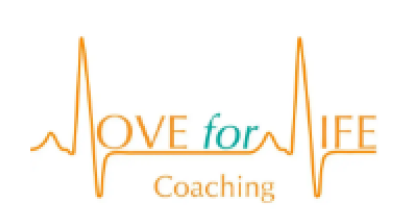 McCaffrey achieved perfection on the Forgiveness Therapy course by correctly answering all 120 of the multiple-choice exam questions (8 questions for each of the 15 lessons). She completed the course in a 6-month period while working full time.
McCaffrey achieved perfection on the Forgiveness Therapy course by correctly answering all 120 of the multiple-choice exam questions (8 questions for each of the 15 lessons). She completed the course in a 6-month period while working full time.
Forgiveness Therapy, an online CE Course, is based on the book by the same title written by psychologist Dr. Robert Enright, co-founder of the IFI, and psychiatrist Dr. Richard Fitzgibbons, director of the Institute for Marital Healing outside Philadelphia, PA. The course was developed by Dr. Enright and Dr. Elizabeth Gassin, Professor of Educational Psychology at Olivet Nazarene University, Bourbonnais, IL.
Although primarily designed for licensed psychologists, the course has also proven beneficial for ministers, psychiatrists, social workers, nurses, and other professional counsellors who have completed it.
Learn more:
- Read about the Forgiveness Therapy online CE course.
Agape Love and Forgiveness Conference Speaker Videos Available in Four Languages
Speaker videos from the International Educational Conference on Agape Love and Forgiveness, held July 19-20, 2022, in Madison, Wisconsin, USA, (funded by the John Templeton Foundation) can now be viewed online absolutely free in four languages–Arabic, English, Hebrew, and Mandarin–using the links below.
The 26 professionally produced presentations feature educators from Northern Ireland, Israel (both Hebrew- and Arabic-speaking), Taiwan, the Philippines, and the US. They describe their experiences teaching agape love and forgiveness to their 5th grade students and outline creative Forgiveness Education teaching techniques.

“Forgiveness Pioneer” Wins Inaugural Gold Medal Award for Impact in Psychology
The scientific application of forgiveness, forgiveness education, and forgiveness therapy is being singled out for its “game-changing impact on the field of psychology” by the country’s largest and oldest organization of doctoral-level psychologists.
The American Psychological Foundation (APF), the grant-making arm of the American Psychological Association (APA), has just announced the winner of its first-ever Gold Medal Award for Impact in Psychology—Dr. Robert Enright, a professor of Educational Psychology at the University of Wisconsin-Madison, and founder of the International Forgiveness Institute.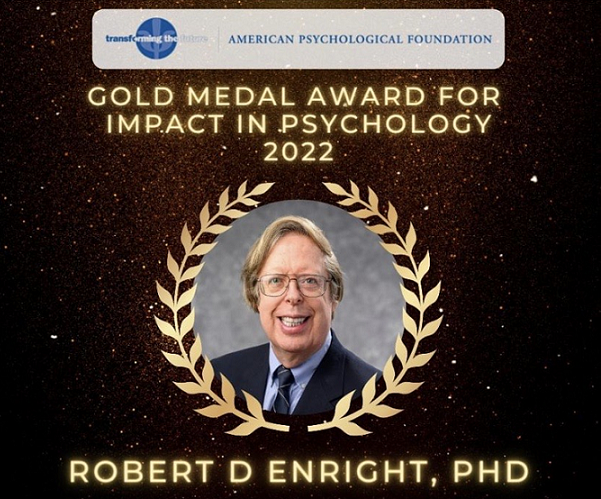
Classified as one of psychology’s highest honors, the award “recognizes a psychologist whose work has had a game-changing impact on the field of psychology,” according to APF board president Terence M. Keane, PhD. He added that the new award acknowledges “a psychologist’s body of work that has been impactful, innovative, and transformational.”
Prior to this year, the award was called the Gold Medal Award for Life Achievement and it has been bestowed on exceptional psychological innovators by the APF for the past 65 years. Previous winners have included B. F. Skinner (the 1971 winner who developed behavior analysis), Harry Harlow (the 1973 winner and a UW-Madison psychologist like Dr. Enright), Rollo May (1987), Mary Ainsworth (1998), and Albert Bandura (2006).
“For the APA and the APF to position forgiveness alongside the creative achievements of those giants in the field of psychology is truly a profound pronouncement,” Dr. Enright said after learning of his recognition.
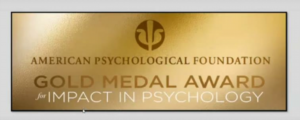 As a grant making foundation, the APF helps fund psychologists and students worldwide who are using psychology to address major issues and improve lives. The APA has more than 133,000 members—doctoral-level researchers, educators, clinicians, consultants, and students (associate members). Combined, the two organizations have more than 500 staff members who focus on providing services to psychologists like Dr. Enright who have dedicated their lives to improving the mental health and welfare of others.
As a grant making foundation, the APF helps fund psychologists and students worldwide who are using psychology to address major issues and improve lives. The APA has more than 133,000 members—doctoral-level researchers, educators, clinicians, consultants, and students (associate members). Combined, the two organizations have more than 500 staff members who focus on providing services to psychologists like Dr. Enright who have dedicated their lives to improving the mental health and welfare of others.
Dr. Enright, a licensed psychologist, has devoted 37 years to the scientific study of forgiveness. As the unquestioned pioneer in the field of forgiveness, Dr. Enright published the first social scientific journal article on person-to-person forgiveness and the first cross-cultural studies of interpersonal forgiveness. He also pioneered forgiveness therapy and developed an early intervention to promote forgiveness–the 20-step “Process Model of Forgiving.”
The Enright Forgiveness Inventory (EFI), an objective measure of the degree to which research participants forgive another who has been unjust and hurtful toward them, is now used by researchers around the world. The Enright Forgiveness Inventory for Children (EFI-C), the Enright Self-Forgiveness Inventory (ESF-I), and the Enright Group Forgiveness Inventory (EGFI) have all become standard research tools known simply by their abbreviations.
Dr. Enright also pioneered the use of forgiveness therapy in clinical practice by developing 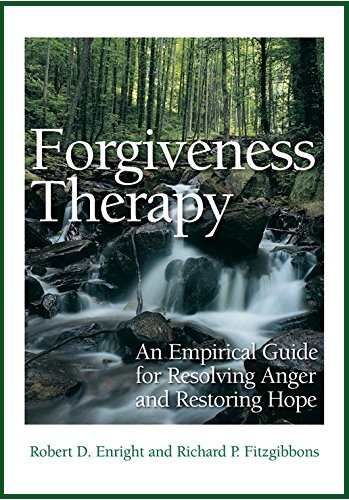 interventions that gained critical acclaim with the APA’s publishing in 2015 of Forgiveness Therapy, an instructional manual for clinicians written by Dr. Enright and psychiatrist Richard Fitzgibbons, MD. The two authors were selected in 2019 as recipients of the prestigious Expanded Reason Award presented by the University Francisco de Vitoria (Madrid, Spain) in collaboration with the Vatican Foundation Joseph Ratzinger/Benedict XVI (Rome, Italy) “to recognize and encourage innovation in scientific research and academic programs.”
interventions that gained critical acclaim with the APA’s publishing in 2015 of Forgiveness Therapy, an instructional manual for clinicians written by Dr. Enright and psychiatrist Richard Fitzgibbons, MD. The two authors were selected in 2019 as recipients of the prestigious Expanded Reason Award presented by the University Francisco de Vitoria (Madrid, Spain) in collaboration with the Vatican Foundation Joseph Ratzinger/Benedict XVI (Rome, Italy) “to recognize and encourage innovation in scientific research and academic programs.”
Dr. Enright’s ambitious approach to forgiveness education included the development of 14 Forgiveness Education Curriculum Guides for students in grades Pre-K through 12th. Through stories, children learn about the five moral qualities most important to forgiving another person–inherent worth, moral love, kindness, respect and generosity—and eventually, how they themselves can become a forgiving person.
A just-completed meta-analysis by University of Wisconsin-Madison researchers involving more than 1,500 students in 10 countries shows that students enrolled in Forgiveness Education Programs demonstrated reduced anger and increased forgiveness toward those who have hurt them. Those forgiveness guide lesson plans, distributed through the IFI, have been requested by educators in more than 30 countries and contentious regions around the world.
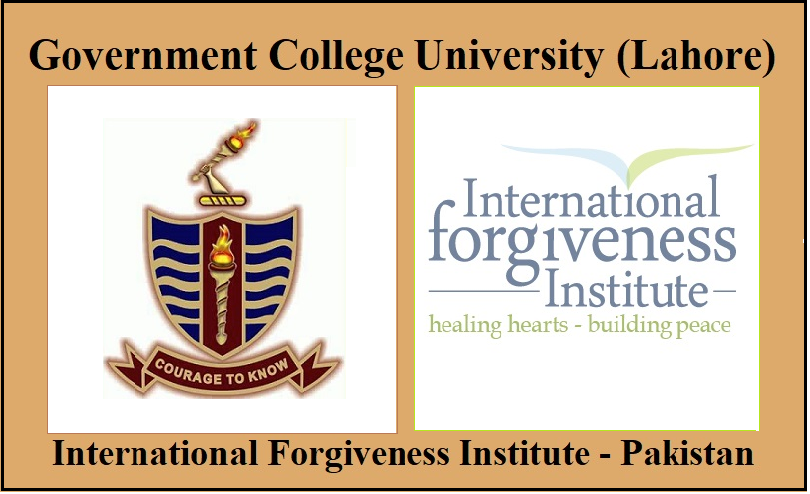 Adding to its forgiveness education agreements with many of those countries, the IFI’s newest Branch Office is IFI-Pakistan, a partnership with the Government College University Lahore, Lahore, Pakistan–the first in that country and in Southern Asia. In Greece the IFI has trained more than 600 grade school instructors in the past 8 years who are now teaching forgiveness to more than 6,000 Greek students.
Adding to its forgiveness education agreements with many of those countries, the IFI’s newest Branch Office is IFI-Pakistan, a partnership with the Government College University Lahore, Lahore, Pakistan–the first in that country and in Southern Asia. In Greece the IFI has trained more than 600 grade school instructors in the past 8 years who are now teaching forgiveness to more than 6,000 Greek students.
“Although the virtue of forgiveness has made astronomical strides in the past few decades, we are just on the edge of what it can offer us for the future,” Dr. Enright says. “Forgiveness must have a seat at the peace-keeping and peace-making table.”
According to Dr. Enright, his body of work has clearly demonstrated that as people forgive, they become less angry, less depressed, less anxious, and more hopeful of their future. In other words, people become more peaceful within themselves, making the possibility of peace with others more likely.
Dr. Enright has outlined his grass-roots approach to peace through a variety of forums beginning with his 2010 article “Forgiveness Education as a Path to Peace,” his 2014 address to the United Nations Population Fund “Forgiveness as a Peace Tool,” and his recent series of 3 essays on peace published on the Psychology Today digital website.
In 2015, Dr. Enright accompanied Eva Mozes Kor, a survivor of the Holocaust, on a series of US radio interviews to promote peace through forgiveness. His peace initiatives have earned him peace educator awards including being named a Paul Harris Fellow by Rotary International in 2016.
Time magazine has called Dr. Enright “the forgiveness trailblazer.” The Los Angeles Times said Dr. Enright is “the guru of what many are calling a new science of forgiveness.” The Christian Science Monitor called Dr. Enright “the father of forgiveness research.”
As the recipient of the 2022 Gold Medal Award for Impact in Psychology, Dr. Enright will be honored during APA 2022–the annual American Psychological Association convention on August 5th in Minneapolis, MN. He will receive a gold medal plaque and a modest honorarium during the APF Friends of the Foundation reception.
About a year ago, my wife did something that hurt me very deeply. She has not apologized and does not feel responsible because her actions lacked the intention to cause pain. I don’t wish her any ill will, nor do I want to hurt her back. While I believe I can forgive her, even without an apology, is it inconsistent with the notion of forgiveness that I feel she cannot remain my wife if she will not take responsibility for her part in my suffering?
Yes, it is inconsistent to both forgive your wife and to consider leaving her for the hurt she caused you, especially when her action appears to be a one-time act that was not repeated. To put in perspective what I am saying, I think you may have a good case against your marriage if: a) she showed a pattern before marriage that made it impossible for her to be a wife to you; b) she continued this pattern that is so extreme that she was not a wife to you during the marriage, and c) it appears, from the counsel you receive from competently wise people, that she does not have the capacity for the future to truly be a wife to you.
Perhaps you both need to sit down and revisit the hurtful event from a year ago. She says that she never intended to hurt you. Sometimes, intentions that are not directed toward the unjust and cruel nonetheless are morally wrong. Here is an example: A person at a party knows that she will be driving. Yet, she drinks and then drinks to excess. She gets behind the wheel of the car, drives, crashes into another car, and breaks the leg of the other driver. She did not intend wrong. She tried to be careful even though she had too much alcohol in her. The act itself was negligent even though there was no intent to break another person’s leg. It was negligent precisely because the consequences of driving under the influence can be dire even with the best of intentions.
Does your wife see this: one can act unjustly even with intentions that are not leaning toward doing something unjust? Do you see this: Her actions, though hurtful to you, may not have been unjust? Try to have a civil dialogue about these issues. And continue to deepen your forgiveness and to see that your avowed commitment to your wife is far deeper than one even enormous hurt that she inflicted on you.

